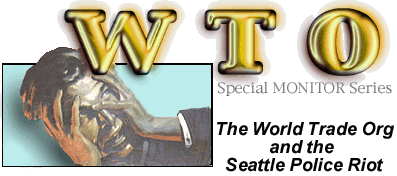INDEX
to WTO articles in this issue

|
|
 |
Add
a new constituency to the long list of World Trade Organization (WTO) critics which already includes consumers, labor, environmentalists, human rights activists, fair trade groups, AIDS activists, animal protection organizations, those concerned with Third World development, religious communities, women's organizations. The latest set of critics includes WTO backers and even the WTO itself.
As the WTO faces crystallized global opposition -- to be manifested in massive street demonstrations and colorful protests in Seattle, where the WTO will hold its Third Ministerial meeting from November 30 to December 3 -- the global trade agency and its strongest proponents veer between a shrill defensiveness and the much more effective strategy of admitting shortcomings and trumpeting the need for reform.
WTO critics now face a perilous moment. They must not be distracted by illusory or cosmetic reform proposals, nor by even more substantive proposals for changing the WTO -- should they ever emerge from the institution or its powerful rich country members. Instead, they should unite around an uncompromising demand to dismantle the WTO and its corporate-created rules.
Here are 10 reasons why:
- The WTO prioritizes trade and commercial considerations over all other values. WTO rules generally require domestic laws, rules and regulations designed to further worker, consumer, environmental, health, safety, human rights, animal protection or other non-commercial interests to be undertaken in the "least trade restrictive" fashion possible -- almost never is trade subordinated to these noncommercial concerns.
- The WTO undermines democracy. Its rules drastically shrink the choices available to democratically controlled governments, with violations potentially punished with harsh penalties. The WTO actually touts this overriding of domestic decisions about how economies should be organized and corporations controlled. "Under WTO rules, once a commitment has been made to liberalize a sector of trade, it is difficult to reverse," the WTO says in a paper on the benefits of the organization which is published on its web site. "Quite often, governments use the WTO as a welcome external constraint on their policies: 'we can't do this because it would violate the WTO agreements.'"
- The WTO does not just regulate, it actively promotes, global trade. Its rules are biased to facilitate global commerce at the expense of efforts to promote local economic development and policies that move communities, countries and regions in the direction of greater self-reliance.
- The WTO hurts the Third World. WTO rules force Third World countries to open their markets to rich country multinationals, and abandon efforts to protect infant domestic industries. In agriculture, the opening to foreign imports, soon to be imposed on developing countries, will catalyze a massive social dislocation of many millions of rural people.
- The WTO eviscerates the Precautionary Principle. WTO rules generally block countries from acting in response to potential risk -- requiring a probability before governments can move to resolve harms to human health or the environment.
- The WTO squashes diversity. WTO rules establish international health, environmental and other standards as a global ceiling through a process of "harmonization;" countries or even states and cities can only exceed them by overcoming high hurdles.
- The WTO operates in secrecy. Its tribunals rule on the "legality" of nations' laws, but carry out their work behind closed doors.
- The WTO limits governments' ability to use their purchasing dollar for human rights, environmental, worker rights and other non-commercial purposes. In general, WTO rules state that governments can make purchases based only on quality and cost considerations.
- The WTO disallows bans on imports of goods made with child labor. In general, WTO rules do not allow countries to treat products differently based on how they were produced -- irrespective of whether made with brutalized child labor, with workers exposed to toxics or with no regard for species protection.
- The WTO legitimizes life patents. WTO rules permit and in some cases require patents or similar exclusive protections for life forms.
Some of these problems, such as the WTO's penchant for secrecy, could potentially be fixed, but the core problems -- prioritization of commercial over other values, the constraints on democratic decision-making and the bias against local economies -- cannot, for they are inherent in the WTO itself.
Because of these unfixable problems, the World Trade Organization should be shut down, sooner rather than later.
That doesn't mean interim steps shouldn't be taken. It does mean that beneficial reforms will focus not on adding new areas of competence to the WTO or enhancing its authority, even if the new areas appear desirable (such as labor rights or competition). Instead, the reforms to pursue are those that reduce or limit the WTO's power -- for example, by denying it the authority to invalidate laws passed pursuant to international environmental agreements, limiting application of WTO agricultural rules in the Third World, or eliminating certain subject matters (such as essential medicines or life forms) from coverage under the WTO's intellectual property agreement.
These measures are necessary and desirable in their own right, and they would help generate momentum to close down the WTO.
© Russell Mokhiber and Robert WeissmanRussell Mokhiber is editor of the Washington, D.C.-based Corporate Crime
Reporter. Robert Weissman is editor of the Washington, D.C.-based
Multinational Monitor
Read The New Corporate Predator in a previous issue of the Montior
Comments? Send a letter to the editor.Albion Monitor
November 26, 1999 (http://www.monitor.net/monitor)All Rights Reserved. Contact rights@monitor.net for permission to use in any format. |

